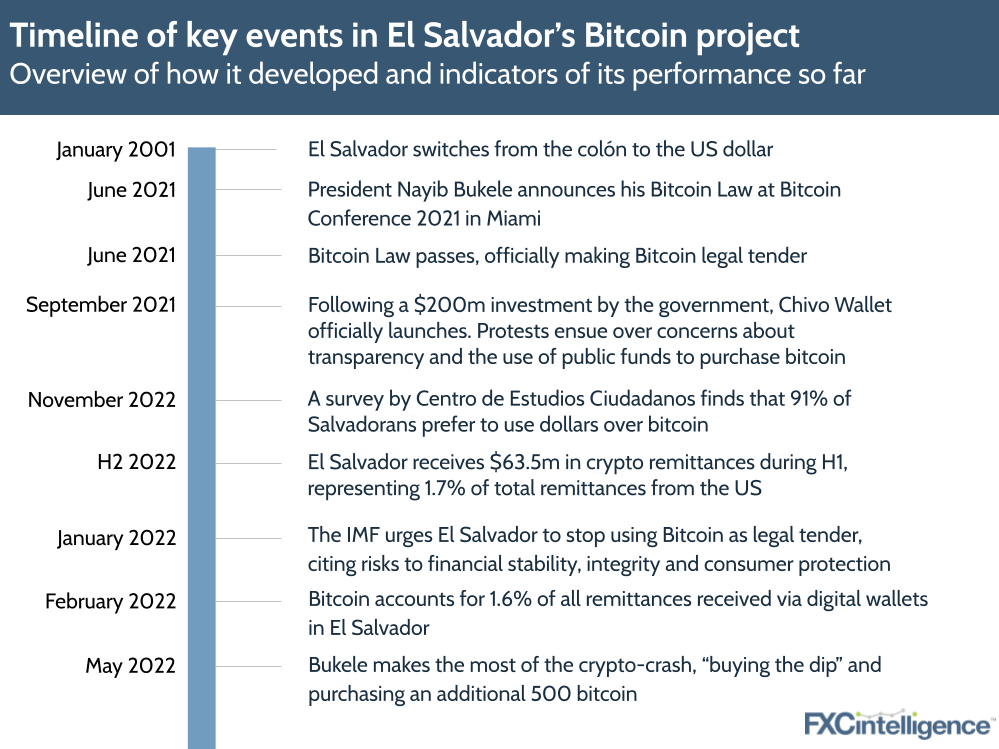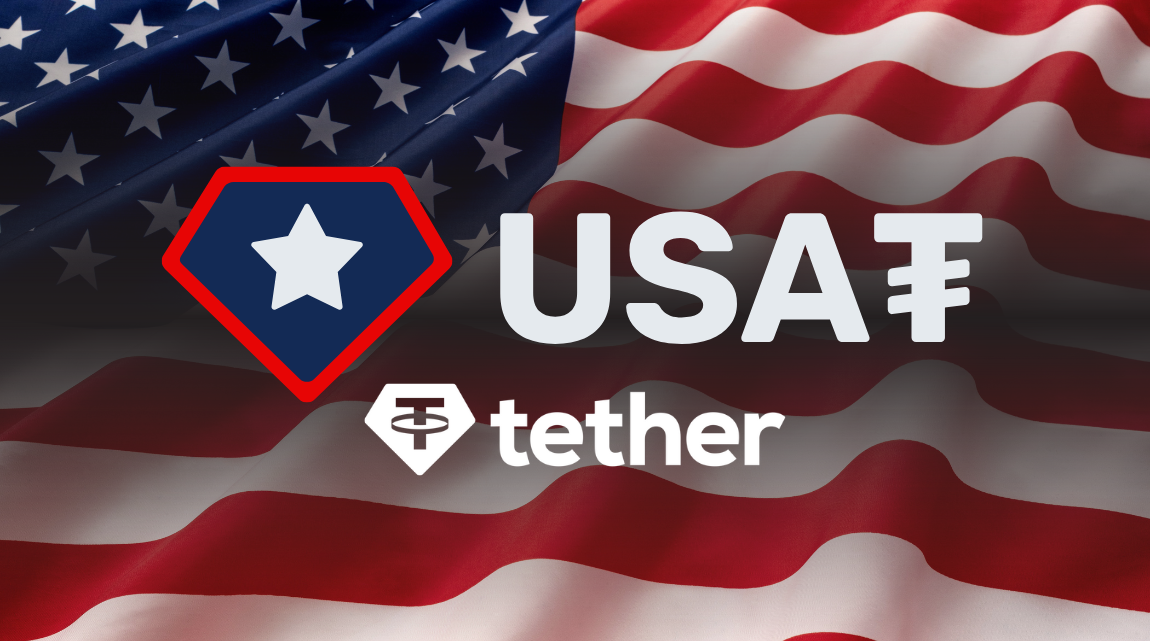In 2021, El Salvador became the first country in the world to adopt bitcoin as legal tender, a move that has seen no small amount of volatility since.
A year ago, El Salvador’s President Nayib Bukele announced that his country would become the first in the world to adopt bitcoin as a legal tender; an unprecedented move that both stunned international spectators and overjoyed crypto enthusiasts. For a country where a large proportion of the population remains unbanked however, this was seen as a bold and somewhat risky endeavour.
One year on, we look at how this project has played out amidst an environment that has individual investors, let alone government administrations, apprehensive about bitcoin’s performance, and whether it can still indeed achieve its desired goals.
El Salvador’s bitcoin dream
In June 2021, El Salvador’s government published its “Bitcoin Law”, announcing it would make the digital currency legal tender within the country. The legislation became law two months later. In principle, this means that the cryptocurrency, alongside El Salvador’s other currency, the US dollar, can be accepted as a means of payment for taxes and outstanding debts, and businesses are obliged to accept bitcoin as a medium of exchange for all transactions.
Bukele’s idea was essentially to create the world’s first circular bitcoin economy, where people can be paid in bitcoin and use it as a means of exchange to pay for, essentially, anything. Having already invested $100m of his country’s reserves into the cryptocurrency, Bukele hoped that by making his country a crypto-friendly destination, he would attract investment from around the world. He even spoke of a parallel tourism promotion targeting bitcoin enthusiasts.
Challenges to bitcoin’s adoption
However, concerns surrounding the feasibility of this experiment were immediately evident. Four challenges can be identified: financial, technological, social and security. Firstly, it’s thought that bitcoin’s adoption could pose risks related to the financial and economic stability of the country.
Secondly, there are technological obstacles, since this nascent technology and the tools required to use it securely and efficiently are still little known to most Salvadorians. Such tools and solutions would need to create financial services that are accessible to all demographics, and would simultaneously need to be user-friendly and safe.
Third is the social challenges, which involve educating Salvadorans about bitcoin’s usability and security, as well as the potential benefits of using it to conduct daily transactions. Enough users would need to be convinced to take up the technology for it to become attractive, normalised and successful.
And finally, there are several perceived security risks related to citizens using non-custodial wallets, such as know your customer, anti-money laundering, and combatting of financing of terrorism, to name a few. The government would need to establish and implement robust standards and practices in order to mitigate such threats and ensure successful uptake and operation.

El Salvador’s remittance-heavy economy
El Salvador has an economy that is heavily dependent on remittances; they account for over 20% of its GDP, according to the World Bank. The cost of a remittance from the US to El Salvador can be up to 30-50% of the value of the transfer, not to mention the logistical and time costs related to obtaining physical money. Given this, one of the main goals of this legislation has been to embrace bitcoin as a neutral store of value for savings, thus allowing the country to reduce its reliance on the dollar.
Bukele believes that bitcoin can make it easier for Salvadorans to receive remittances from relatives abroad. Ostensibly, Bitcoin could also facilitate easier access to financial services, increase financial inclusion and draw millions of people who previously lacked bank accounts into the financial system; particularly beneficial in a country where over 70% of its population remains unbanked.
However, according to El Salvador’s central bank, the country received just $63.5m in crypto remittances during the first half of 2022, making up a mere 1.7% of the total remittances from the US. Of course, it will take time for locals to get used to bitcoin remittances, and Bukele and his administration seem sanguine about this.
Encouraging uptake; an uphill struggle
In an effort to incentivise citizens to use bitcoin, in September last year the government poured $200m of public money into its subsidised ‘Chivo Wallet’, an app that allows users to digitally trade both bitcoin and dollars without paying transaction fees. Those who downloaded the app were eligible to receive $30 worth of bitcoin as an incentive, in addition to gas expenditure discounts.
Such offers are certainly not negligible in El Salvador, where $30 equates to 0.7% of annual income per capita, and where one-fifth of its population live on less than $5.5 a day. The app was downloaded four million times, in a country of just 6.5 million people.
However, findings by the National Bureau of Economic Research, a non-profit, suggest that Chivo has been far from a success, with its launch plagued by glitches and security issues and many of its users abandoning it after spending the $30 bonus or, at most, only using it as a digital dollar debit card.
In February 2022, bitcoin accounted for just 1.6% of all remittances received via digital wallets in El Salvador. Since then, download numbers have remained low, implying the app may have lost its appeal.
Alternative solutions: N1co’s digital bank aspirations
Nonetheless, fintechs seem to be picking up the baton, by taking the slow and steady road to gaining user confidence and crypto uptake, much in contrast to the government’s precipitous approach.
N1co, for example, is striving to succeed where the government has so far come short. Made by the same team that created Hugo, the taxi-hailing app that ousted Uber from El Salvador, n1co has focused on tried-and-tested fintech offerings such as QR codes, debit cards and point-of-sale systems, all based on the dollar. The company is harnessing El Salvador’s developing market, which remains underserved by financial products despite the Bukele administration’s bitcoin push.
By emphasising simpler offerings, such as payment links that can be sent through WhatsApp without having to download a new app or crypto-powered digital wallet, n1co represents a markedly different approach from the government’s. Eventually, n1co plans to incorporate bitcoin into its offerings, and is in talks with major crypto companies such as Qredo to enable bitcoin payments on its platform.
N1co’s goal is to become a digital bank, not just a payment tool for businesses, gradually building user confidence in digital banking tools. The company envisages a time when such users, already comfortable with ‘simpler’ digital banking tools, may move onto bitcoin.
Economic downturn
Taking a step back and looking at the wider picture, things seem bleak. El Salvador’s economy has not been faring well since the legislation came into effect, and in February Fitch downgraded the country’s credit score, meaning that it has now become more expensive for Bukele to borrow much-needed cash.
The country is facing an increased reliance on short-term debt, a still-high fiscal deficit and limited scope for additional local market financing. Fitch considers the country’s political landscape to play a large role in this downgrade, citing weakened institutions; policy uncertainties, stemming from a more concentrated power in the presidency; and its adoption of bitcoin as a legal tender.
El Salvador’s deficit remains high; its short-term debt has risen sharply over the last two years, and it looks unlikely that the country is in a good position to resettle its loans. At the end of 2021, its debt stood at $24.4bn, up from $19.8bn at end-2019 following the allocation of millions of dollars to deal with the Covid-19 pandemic and its consequent economic effects.
The ditching of its local currency, the colón, in favour of the dollar in 2001 means that, unlike many other countries, it cannot print cash to shore up its finances, since only the US Federal Reserve can print more dollars. Negotiations have stalled with international lenders in part because they are unwilling to throw money at a country that is spending millions in tax dollars on a cryptocurrency that is prone to extreme volatility.
Strained relationships with financiers
Bukele’s bitcoin play has also placed the country at odds with the International Monetary Fund (IMF), from which it is seeking $1.3bn in financing. The IMF has said that in order to receive financial aid, El Salvador would have to address credit risks “related to the adoption of bitcoin as legal tender”, but it remains to be seen whether Bukele will heed this advice.
Ratings agencies have also warned that bitcoin adoption could facilitate money laundering, and the risk from bitcoin has given bond investors more reason to demand higher returns.

Impact of the crypto winter
Further adding to El Salvador’s financial woes is bitcoin’s performance. At the time of writing, bitcoin has been performing badly, and it is estimated that the recent crypto slump may have shaved off one third of the government’s $100m holdings. Bitcoin has fallen 45% since El Salvador’s official adoption of it last September.
Despite this, Bukele remains defiant, stating that he would make the most of the ‘dip’; in July he doubled down on his bitcoin investments, purchasing a further $1.5m. The finance minister, Alejandro Zelaya, also attempted to make light of the situation, stating that El Salvador hasn’t really suffered any loss because it hasn’t sold any of its bitcoin.
Bitcoin City and Volcano Bonds
Bukele wants to take the experiment further, by building a “Bitcoin City” which would be located at the foot of a volcano that could provide sufficient geothermal energy to power a giant bitcoin mine. The idea is that this could raise money by selling $1bn worth of ‘Volcano Bonds’. Officials say they are confident the project would be profitable. However, these so-called Volcano Bonds were supposed to go on sale in March, and at the time of writing, they are yet to show any sign of appearing.
Crypto adoption outside of El Salvador
El Salvador is by no means alone in its headstrong bitcoin endeavours. Whilst its government may have been the first in spearheading a nationwide cryptocurrency initiative, bitcoin has bloomed in popularity in other nations such as Lebanon, Venezuela and Argentina, whose governments and citizens alike have flocked to crypto as a better bet than their respective unstable currencies, which have been suffering from rampant inflation.
A more cynical viewpoint is that cryptocurrencies have become something of a ‘currency of last resort’ for such countries, encouraged by governments whose central banks are weak, ineffective and, in some cases, failing. Some experts believe that since only a finite amount of bitcoin will ever be created, it can retain its fundamental value over time and act as a hedge against inflation in places where the local currency has decreased in value, due to the machinations of a central bank or the overprinting of cash.
Crypto has also proven useful for governments subject to heavy international sanctions. In 2019, cash-short but resource-rich Iran became one of the first countries in the world to legalise industrial-scale crypto mining. The government provides licensed bitcoin miners with free electricity, with the generated bitcoin then sold back to the country’s central bank. Iran seems to be working around sanctions prohibiting it from selling oil and gas on the international market by essentially converting these fossil fuels into lucrative bitcoin.
Additionally, prior to bitcoin’s latest crash in May this year, the Central African Republic’s President Faustin-Archange Touadéra announced on Twitter that the country would be taking a similar step to El Salvador, describing bitcoin as “universal money”. However, the decision was met with widespread scepticism.
Can El Salvador’s crypto bet produce tangible benefits?
In spite of bitcoin’s recent glum performance on the global market, El Salvador’s financial difficulties and limited adoption among its citizens, Bukele seems undaunted. The President has remained steadfast in his vision of making El Salvador a crypto-friendly destination that can attract global investment; make it easier for Salvadorans to receive remittances from abroad; and be an overall positive force that will, as he puts it, “push humanity at least a tiny bit into the right direction”.
So far, however, onlookers generally remain unconvinced that any such results touted by Bukele have or will come to fruition. Being the first of its kind, El Salvador is certainly a curious case of crypto enthusiasm, and how a government leader has been co-opting crypto largely for their own purposes. Whether such a project can really translate into tangible benefits to the country’s economy, and most crucially, its businesses and individuals, however, remains to be seen.



